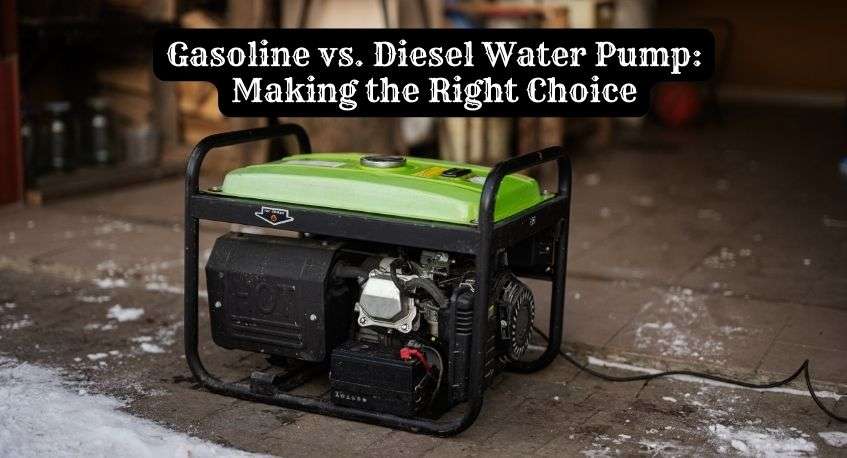
When it comes to selecting the right water pump for your specific needs, you'll likely encounter two primary options: gasoline and diesel water pumps. Both of these pumps have their advantages and disadvantages, and the choice between them largely depends on your specific requirements. In this blog, we will provide an informative comparison of gasoline and diesel water pumps to help you make an informed decision.
One of the first factors to consider when choosing between gasoline and diesel water pumps is the cost. Gasoline water pumps typically have a cheaper upfront cost compared to their diesel counterparts. This affordability makes them an attractive option for those working within budget constraints or for occasional use. On the other hand, diesel water pumps tend to be more expensive initially. However, it's essential to consider long-term costs, as diesel engines are known for their durability and longevity. Over time, the reduced maintenance and fuel consumption of diesel pumps can offset their higher upfront price.
The variety of available models is another crucial factor when choosing a water pump. Gasoline water pumps offer a broader range of options compared to diesel water pumps. You can find gasoline-powered pumps in various sizes and configurations to suit different applications. This diversity allows you to select a pump that precisely matches your specific needs. Diesel water pumps, on the other hand, have fewer models available, which may limit your choices. If you have unique requirements, gasoline water pumps may be more accommodating.
Maintenance plays a significant role in the longevity and reliability of water pumps. Gasoline water pumps tend to be easier to start and maintain. They usually require less effort when starting the engine and are less finicky when it comes to cold weather. In contrast, diesel water pumps can be harder to start, especially in colder climates. They may require glow plugs and additional warm-up time. Moreover, diesel engines typically have more robust maintenance requirements, including fuel filter changes and periodic fuel injector maintenance.
Fuel efficiency is a critical consideration, especially for prolonged or frequent use. Diesel water pumps are known for their superior fuel efficiency. They can run for longer periods on the same amount of fuel compared to gasoline pumps. This efficiency translates to reduced operating costs and fewer interruptions for refueling. Gasoline water pumps, while effective, are generally less fuel-efficient, which may result in higher fuel expenses over time.
The power output of a water pump is another critical factor when choosing between gasoline and diesel models. Diesel water pumps are known for their higher power output, making them suitable for heavy-duty applications. They can handle larger volumes of water and higher pressure requirements, making them ideal for industrial and agricultural use. Gasoline water pumps, while effective for many tasks, tend to be less powerful and may struggle with more demanding jobs.
Environmental concerns are becoming increasingly important in today's world. When it comes to emissions, diesel water pumps have an advantage over gasoline pumps. Diesel engines generally produce lower emissions, including lower carbon dioxide (CO2) output. This makes them a more environmentally friendly option, particularly for users who are conscious of their carbon footprint. Gasoline water pumps, on the other hand, tend to have higher emissions, contributing to air pollution.
Let's summarize the key differences between gasoline and diesel water pumps in the following chart:
| Aspect | Gasoline Water Pumps | Diesel Water Pumps |
| Cost | Inexpensive upfront cost | More expensive |
| Variety | More models available | Fewer models available |
| Maintenance | Easier to start and maintain | Harder to start and maintain |
| Fuel Efficiency | Less efficient | More efficient |
| Power | Less Powerful | More Powerful |
| Emissions | Higher emissions | Lower emissions |
The choice between a gasoline or diesel water pump ultimately depends on your specific needs and priorities. If you are looking for a more affordable and versatile option for occasional use, gasoline water pumps may be the way to go. However, if you require higher power output, superior fuel efficiency, and lower emissions for heavy-duty applications, a diesel water pump is likely the better choice. Consider your budget, the frequency of use, and the environmental impact when making your decision. Whichever option you choose, proper maintenance and responsible use are essential for ensuring the longevity and efficiency of your water pump.